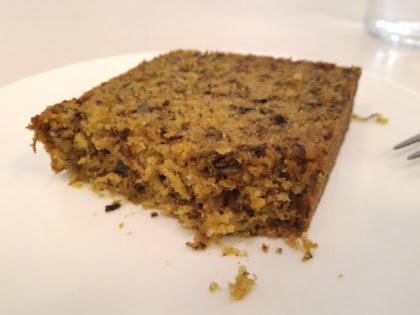The main draw of the "raindrop cake" is a HUGE drop of water that's been reinforced with a bit of agar-agar, a gelatin-like substance extracted from seaweed. It contains only enough agar-agar to maintain its appearance as a gigantic drop of water; it dissolves into a puddle after about half an hour on the plate and it is more fragile than most jellies.
Hence, my bemusement and annoyance at New Yorkers paying US$8 for what I consider the 1MDB of jellies: something that looks good but lacks substance and is not structurally sound. And it's as if Westerners haven't heard of jelly before.

♪ Raindrops keep fallin' on that plate, like the hipsters hankerin' for a
taste; gotta Instagram it, then ooh and ahh over it, raindrops keep fallin'
on that plate, keep a-fallin' ♫ (not my photo; taken from NDTV Food)
taste; gotta Instagram it, then ooh and ahh over it, raindrops keep fallin'
on that plate, keep a-fallin' ♫ (not my photo; taken from NDTV Food)
As someone helpfully pointed out a few hours after I tweeted the recipe and origins of the dessert, the so-called "raindrop cake" - a.k.a. mizu shingen mochi (水信玄餅) - came from Japan. A company in Yamanashi Prefecture in Central Honshu made this transparent interpretation of the more conventional shingen mochi, said to have been named for Shingen Takeda, a medieval Japanese warlord. It's been around since 2014, I believe, and you can find recipes for it and its variants online.
Mochi in Japanese means "cake" or "biscuit", but there's nothing in the waterdrop thingy that suggests it is a cake in any way we are familiar with; hence, perhaps, the inclusion of the roasted soya bean powder (kinako) and brown sugar syrup.
Yes, it has no calories and is ephemeral, clean-flavoured, vegan and transparent. Much Zen. So healthy. Wow. The Japs nailed this embodiment of the Zen philosophy with aplomb.
BUT.
Whichever way you look at it, it is. Not. A. Cake. Just a blob of not-very-dense jelly with soya bean powder and sugar syrup on the side.

Yes, I made one. Or something close to it. Because I wanted to see
one for real and am too frugal to pay US$8, plus the airfare to
New York and accommodation. Used a bowl instead of a mould.
one for real and am too frugal to pay US$8, plus the airfare to
New York and accommodation. Used a bowl instead of a mould.
So I posted a hysterical tweet about it, throwing in a veiled and possibly racist reference to Calvin Trillin's controversial Chinese-food poem in The New Yorker. Like some, I thought Trillin was making fun of New York foodies who seem to get thrown for a loop each time something emerges from the mysterious East and start writing poetry.
Kaya toast that's "implausibly tall and as porous as coral", sealed with "celadon-hued coconut jam"? Blue glutinous rice that "spent the night with a fistful of morning glories"?
And muah chee (a local mochi-esque snack) that looks like "larval nubs of hot mochi pitched in roasted ground peanuts, sesame seeds and sugar"?
Okay, whatever. After all, it's not the first time you guys found toast trendy. And it seems this fad was also imported from the East.
(By the way, the flower that "spent the night" with the glutinous rice is more likely to be the blue pea flower (Clitoria ternatea). You're welcome.)

Water, agar-agar and heat. I didn't measure exactly how much jelly
powder to use, but it's less than what you'd need for normal agar.
I panicked at first because it didn't seem to set properly. Then,
the mixture started to gel...
powder to use, but it's less than what you'd need for normal agar.
I panicked at first because it didn't seem to set properly. Then,
the mixture started to gel...
I suppose it struck a nerve. Westerners have been accused of cultural appropriation (curry powder and Eastern noms de plume, anyone?), or exoticising otherwise common stuff from the East. Their antics inspire a range of emotions from amusement and bewilderment to annoyance and outrage.
Granted, it may have taken a long time to get the waterdrop illusion right and importing the ingredients from Japan can add to the cost. And maybe Americans aren't used to the idea of eating something that looks like a blob of solid water or, as some have said, a silicone breast implant.
Also, we Malaysians are almost as (if not more) kiasu when it comes to chasing food crazes - remember the salted egg yolk croissants? I'm sure they're still flocking to that little Petaling Jaya bakery. Let's not mention the verbal spats we've had with Singaporeans and maybe Indonesians over who "owns" what dish.
But still...

Not a lot of agar-agar is needed, but the jelly powder did colour this
prototype a little. And I think it's still too firm. Still, go me. I
totally geeked out when it finally came together.
prototype a little. And I think it's still too firm. Still, go me. I
totally geeked out when it finally came together.
Agar-agar is cheap, especially in Malaysia, and this thing made out of it was sold in New York for the price of two Starbucks beverages. And, as you've already seen, the centrepiece can be replicated with a little time and effort.
But above all...
Sore wa kēkide wa arimasen.
It. Is. Not. A. Cake.
Categories:
Uncategorised




























